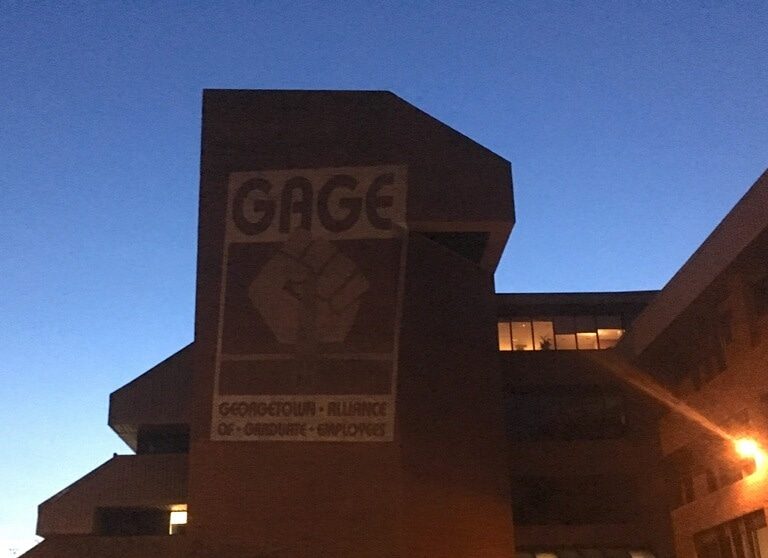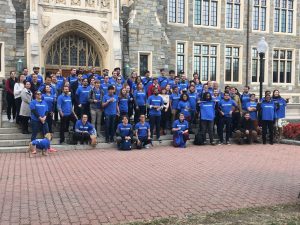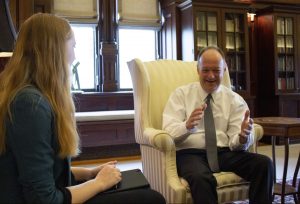Union negotiations between the university and the Georgetown Alliance of Graduate Employees (GAGE) are set to enter their eighth week on Monday. The two parties are continuing to explore a possible union election for graduate students who work for their departments. Frustrated with the wait, GAGE has begun to publically agitate for a speedy conclusion to the talks, one that would give their union the opportunity to gain university recognition.
The seeds of these negotiations were planted in November, when GAGE asked that the university voluntarily recognize their organization as a union. Though GAGE had not had a union election, they claimed that over 50 percent of eligible graduate students had signed materials supporting unionization. The university declined the proposal.
The National Labor Relations Board (NLRB) typically conducts union elections by secret ballot, asking eligible workers to vote on whether they would like to be represented by a union affiliate. If a majority of the workforce votes in favor of union representation, the employer is legally obligated to recognize, negotiate, and bargain with the union.
In December, GAGE proposed a union election, but one conducted by a private arbiter instead of by the NLRB. A private election would close the door to appeals, and some in GAGE feared that an appeal from the university could overturn the Columbia University decision that granted graduate students the right to organize.
In early February, the university announced that the administration was willing to enter negotiations with GAGE with the goal of agreeing to a private union election.
Rachel Pugh, university spokesperson, said that Georgetown is still actively engaging with representatives from the American Federation of Teachers (AFT), the union with whom GAGE has affiliated to discuss the possibility of an election arbitrated by a third-party.
“Georgetown is negotiating with GAGE/AFT on this proposal because we believe it provides an opportunity for a framework that would recognize that our graduate students’ relationship with the University is fundamentally an educational one, while also responding to graduate students’ desire to have a stronger voice in our continuing work to create the conditions under which they can flourish,” she wrote in an email to the Voice.
But GAGE members have said that since February, their patience has grown thin.
“Negotiations do take time, we recognize, but the reality is every day we do not have an election agreement that we can sign is one day less we have to plan a fair and democratic election,” wrote Kevin Carriere, a fourth year Ph.D. student in the psychology department and a member of GAGE’s election negotiation team, in an email to the Voice. “Why they keep bringing proposals to the table that no union, no democratic voting system would be willing to accept – is beyond our comprehension, and in our mind, seems to be a stalling tactic.”
In early March, GAGE began to hand out fliers to potential students and their parents on tours around campus. “Our working conditions are undergrads’ learning conditions,” the flier reads. “[D]espite the contributions graduate workers make to Georgetown, many of us make less than the living wage in DC, are subject to arbitrary changes in pay and working conditions, [and] struggle to afford the costs of health care, child care, and other necessities.”
Similarly, fliers with GAGE’s logo have appeared at residences in Burleith. “Risky Management at Georgetown University?” one reads, above a photo of university President John DeGioia. “[I]nstead of productively engaging with his graduate employees, DeGioia’s administration has antagonized them by slow-walking critical negotiations.”
Louis Poon, a Ph.D. candidate in the chemistry department, said he believes GAGE is optimistic about finalizing negotiations very soon. “Of course, this timeline is dependent on fruitful and timely contributions from the University towards an agreement,” he wrote in an email to the Voice.
On March 26, at GAGE’s invitation, artist and activist Adrian Parsons lit up the front wall of the Intercultural Center with GAGE’s logo, hashtag, and phrases from the university’s Just Employment Policy (JEP): “without intimidation / without unjust pressure / without undue delay.” The JEP assures workers on campus that they have the right to organize under such conditions.
Graduate student unions seeking recognition at other universities, such as Columbia University, Boston College, and University of Chicago have faced slightly different issues than GAGE. Though students at those schools have demonstrated support for unionization through NLRB elections, school administrations are refusing to negotiate with the organizations. Some of these graduate student unions have withdrawn their petitions to the NLRB, fearing that a Trump administration board could overturn their right to organize entirely. AFT president Randi Weingarten has referenced GAGE’s decision to pursue a private election as one of the strategies other graduate student unions may begin to use.
Poon wrote that he was initially skeptical of GAGE because his department, chemistry, had always supported its graduate students. “I came around to supporting GAGE when I thought about preserving our current quality of life,” he wrote. “There may come a time when the department can no longer supplement the annual salary and with the cost of living in DC I can’t imagine being able to do a PhD in Georgetown without it.”





